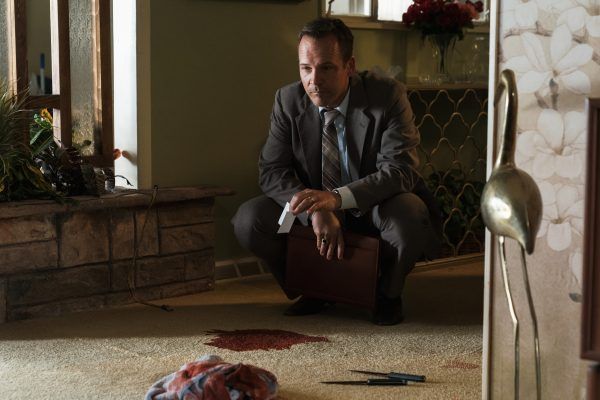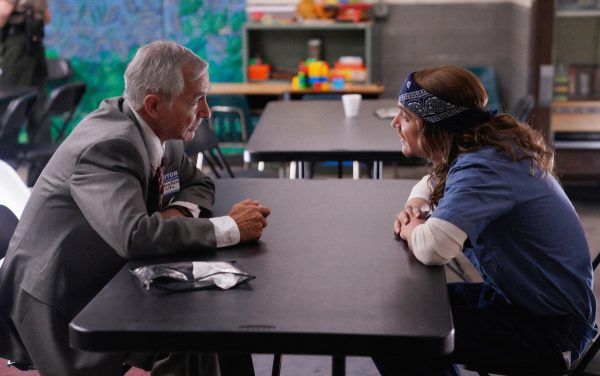I had to watch the pilot of Interrogation at the beginning, and I had to watch the season finale at the end. In between were eight episodes of television that I could choose to watch in any order I pleased. When one episode ended, I would be reminded by helpful onscreen text to return to the main screen and choose another episode -- whatever episode I wanted. Thus is the storytelling gimmick at the crux of Interrogation, a CBS All Access crime drama based on a true case. The goal for this experiment? To make me, the viewer, feel like an actual detective; to put me subjectively in the shoes of an officer working on a cold case, whose following of clues and leads rarely result in a linear path. The result of this experiment? A frustratingly messy season of television, one that seems to be working against its gimmick, too often amplifying its weaknesses, and only rarely striking points of intrigue.
Mary Fisher (Joanna Going) is found dead in her home. Head bashed in by a blunt object, knives sticking out of her back, blood stained on her carpet. Detective David Russell (Peter Sarsgaard) knows who did it: Eric Fisher (Kyle Gallner), Mary's lost, meth-addicted, 17-year-old son. And after an intense -- forgive me -- interrogation, Russell puts him away for life. Only it's not that simple. And creators John Mankiewicz (Bosch) and Anders Weidemann (Björnstad) use the true elements of the case to weave a complicated tale of desperate fathers (David Strathairn), violent drug addicts (Kodi Smit-McPhee), socially-minded lawyers (Andre Royo), and relentless internal affairs agents (Vincent D'Onofrio). Who killed Mary Fisher? Who can we trust? Is there such a thing as "justice"?
These are the kinds of issues explored by many a piece of true crime storytelling, fictionalized or not -- Interrogation even comments on this with a brief "people making a true crime podcast" scene. But they're typically meticulously crafted by an author, presented to us in a way that, even if it doesn't lead to a narratively satisfying conclusion, allows for dramatic momentum, thematic muckraking, and an attempt at catharsis. Interrogation, conversely, basically gives this crafting task to its viewers, only giving them a name of an episode (all named after a notable figure in the case) to go by as a clue. I can count on one hand the amounts of times this gamble actually paid off -- some random episodes I chose had chance details (an answering machine message, for example) disseminated blankly to me, before the next random episode I chose revealed its source (watching the mother leave the answering machine message). In the best version of this, the end of the pilot reveals a name that might next be essential in the case -- choosing to find the episode title with the corresponding name to play next made me, indeed, feel like a detective.
But this fun feeling was brief. In fact, none of the remaining episodes end with a similar kind of "keep investigating!" cliffhanger. In double fact, most of them end with a sense of closure, even wrapping up things with an on-screen "where are they now?" series of facts. And in triple fact, one random episode I chose straight up revealed our main character's final fate. Yes, I knew the season often jumped around in timelines and perspectives, but it felt puzzling, even surreal to keep chasing a case I just watched come to an end.
The season finale doesn't do much to add on to this vital piece of resolution, simply thrown into a viewer-chosen episode in the middle of the season -- in fact, the season finale's contributions don't feel in any way like a satisfying climax to what the season built before. There's a reason traditional modes of television storytelling work -- it's because creators can build exactly what they need to, when they need to, controlling every component with purpose. And I'm not some kind of "experimental storytelling Scrooge." I loved Black Mirror's "Bandersnatch," and I love the Netflix crime drama Criminal, which all takes place locked in an interrogation room across different countries. But their format choices have a purpose. Interrogation instead lurches aimlessly, content to throw around a bunch of plot points that lack any sense of purposeful interconnectivity. Put it this way: If the point of the show is to make me feel like a detective, and I read one case file that jumps ahead to the present and tells me the fate of the guy I'm investigating, why would I keep reading?
Interrogation's flaws don't just lie in its format gamble. From an episodic, moment-to-moment, tone-and-writing-and-filmmaking standpoint, it's trying desperately to serve too many masters, instead resulting in a jumbly soup. Ernest Dickerson directed one of my favorite crime dramas, Juice, a patient and handsomely styled descent into corruption and madness. But his work on the pilot throws all of that out the window, favoring instead a series of itchy jump cuts, bonkers dutch angles, boldly colored lighting choices, and a general performance note that seems to be "louder and angrier, everybody." The aesthetic, which drips throughout the rest of the season, feels like "2000s edge," like someone tried to adapt Jonas Åkerlund's Spun into a TV show, or someone watched all of Breaking Bad on fast motion and said, "I get it." And if that's what Interrogation wants to be, fine! Cool! Make that choice and stick with it!
Except, it doesn't want to stick with anything. It moves from these "grungy genre" vibes to more traditionally CBS "detective's work life gets in the way of home life" vibes, before jumping into "Ryan Murphy genre-as-blunt-social-metaphor" vibes, and then some "ultra-realistic courtroom procedural" vibes, and then straight up "surreal horror" vibes, and on and on and on, never settling on one actual aesthetic point of view or narrative focus (my favorite of these little sub-shows? Strathairn as a dad shot only in neo-noir shadows and colors, diving awkwardly into a criminal underworld he doesn't understand). Some of these vibes do work momentarily -- perhaps unsurprisingly, given the creators' "down-the-middle crime drama" pedigree, they tend to be the most simple, grounded, and familiar vibes. But just when Interrogation gets in a groove for maybe 10 minutes at the most, it quickly chucks it all aside for the next set of vibes to explore. The interaction between CBS' safe network choices and the Wild West of "gritty, uncensored prestige streaming" feels jagged and poking at every turn, almost like Interrogation wants to play dress up with all of the tropes of edgy streaming shows it can before CBS catches it and sends it to bed early.
Ultimately, not unlike the case explored by the detectives, accused killers, and put-upon lawyers of Interrogation, the show doesn't necessarily prove what it's actively trying to prove (crime dramas are interesting if you can choose your own fate). Rather, it forces the viewer to focus on the margins, the moments of intrigue where more familiar, time-tested television pleasures lock in despite their creators' insistence on pointless experimentation -- only in these margins can a form of justice come. If you're a fan of crime storytelling, you will find some engrossing material in Interrogation, and the resolution (no matter how early you get to it) might satisfy you. You'll just have to wade through and ignore a lot of dead ends and chaff to get through it. Hey -- I guess that is what it feels like to be a detective.
Rating: ★★
Interrogation is now streaming exclusively on CBS All Access.




